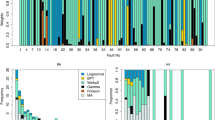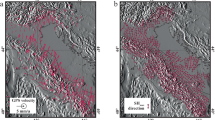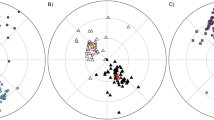Abstract
I SHOULD agree with Mr. Hayes that not much importance should be attached to the difference between Wellington, and Christchurch. The standard error of a reliability r based on n observations is ; then with my data the results are Wellington 0.33±0.10, Christchurch 0.50±0.18. This is for all earthquakes recorded at the stations. For Pacific earthquakes alone, I get Wellington 0.36±0.13, Christchurch 0.56±0.19. The difference is therefore not more than might be attributed to random sampling. On the other hand, we may notice that there were three times as many readings of P at Wellington as at Christehurch, though in most cases the amplitude of the motion of the ground must have been about the same, and many of the inferior observations at Wellington refer to earthquakes when Christchurch failed to record P at all.
This is a preview of subscription content, access via your institution
Access options
Subscribe to this journal
Receive 51 print issues and online access
$199.00 per year
only $3.90 per issue
Buy this article
- Purchase on SpringerLink
- Instant access to full article PDF
Prices may be subject to local taxes which are calculated during checkout
Similar content being viewed by others
References
Mon. Not. Soy. Ast. Soc., Geophys. Suppl., 3, 310 (1935).
Author information
Authors and Affiliations
Rights and permissions
About this article
Cite this article
JEFFREYS, H. Reliability of Seismograph Stations. Nature 138, 464 (1936). https://doi.org/10.1038/138464a0
Issue Date:
DOI: https://doi.org/10.1038/138464a0



